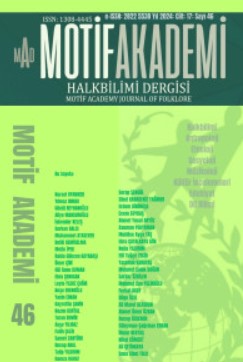ÖĞRENCİ FOLKLORUNDA KAN KARDEŞİ VE KANKA
BLOOD BROTHER AND “KANKA” IN STUDENT FOLKLORE
Author(s): Aliye MANSUROĞLU, Gönül ReyhanoğluSubject(s): Customs / Folklore, Sociology of Culture, Sociology of Education
Published by: Motif Halk Oyunları Eğitim ve Öğretim Vakfı
Keywords: Hatay; brother; blood brother; student folklore; virtual kinship;
Summary/Abstract: Throughout history, people have established kinship through marriage for reasons such as perpetuating their lineage, alleviating loneliness, and feeling safe and empowered. These created kinships based on blood ties. When marriage or blood ties fail to fulfill kinship needs, they establish virtual kinships without blood ties. Virtual kinships, which emerged to meet the requirements and needs of the age, gave rise to new institutions, each with its own name and various definitions. This study focus on the existence of the “kanka” institution and the debate over its status as a virtual kinship, used the popular word “kanka” among high school students. The study employed the short-answer open-ended question technique, a qualitative research method, to gather data. 23 short-answer questions were sent digitally to high school students via a "Google Form." 152 students from five high schools in Hatay voluntarily participated in the study in 2022. Within the framework of content analysis, we transformed the responses into codes and themes. The study revealed the relationship between blood brotherhood and kanka, as well as the structure and formation of friendship. The institution of kanka, once a type of virtual kinship, has evolved into a new form of blood brotherhood. Some family members of high school students also have kanka. Researchers have found out that kanka emerges from needs, shapes a unique form of communication and jargon, and addresses students' needs for fun, sharing, solidarity, support, and socialization.
Journal: Motif Akademi Halkbilimi Dergisi
- Issue Year: 17/2024
- Issue No: 46
- Page Range: 516-540
- Page Count: 25
- Language: Turkish

